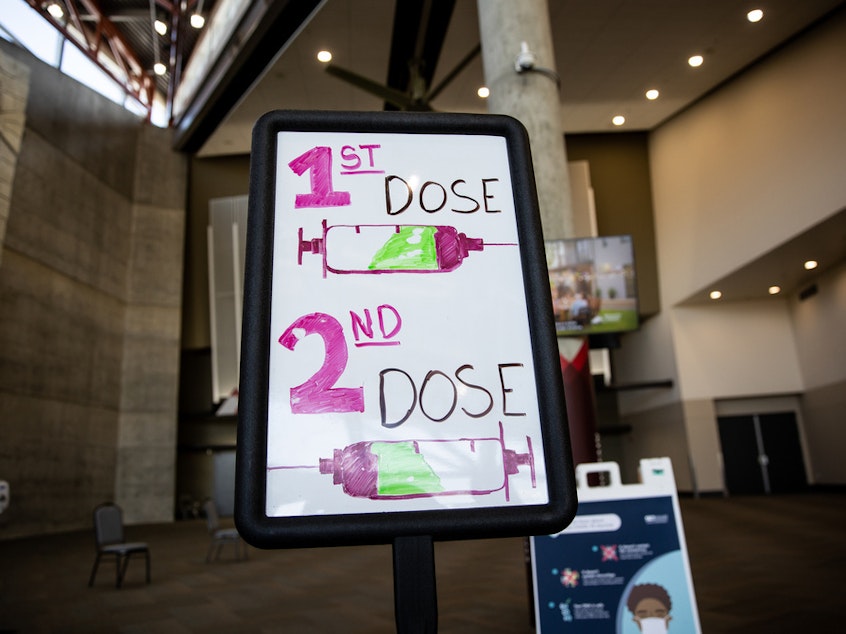Coronavirus FAQ: Is It A Big Deal If I Skip Or Delay Dose 2 Of My COVID Vaccine?

Each week, we answer "frequently asked questions" about life during the coronavirus crisis. If you have a question you'd like us to consider for a future post, email us at goatsandsoda@npr.org with the subject line: "Weekly Coronavirus Questions."
I got my first dose, and now I feel invincible! Do I REALLY need to get the second shot?
Dr. Anthony Fauci devoted his segment of Friday's White House press briefing to the topic of second doses and summed it up like this: "Get vaccinated, and if you're getting a two-dose regimen, make sure you get that second dose."
The good news is that the vast majority of Americans who got the Pfizer or Moderna vaccine are going back for their second dose (those who got Johnson & Johnson, of course, are home-free after one shot). New data from the Centers for Disease Control and Prevention shows that 92% are getting both jabs.
"As a society we want everyone to get two, but to have 92% is really good," says Dr. Jill Weatherhead, assistant professor of adult and pediatric infectious diseases at Baylor College of Medicine.
Compared to rates of some other two-dose vaccines, that 92% looks even better: Only 20% of those children who needed two doses of the influenza vaccine went back for the second jab, and just 75% of adults go back to get their second dose of the shingles vaccine.
More good news: Even if you miss your second appointment by more than the recommended 42-day window, you can still go back for it.
"If you were to miss the designated time interval, you should still get the second vaccine as soon as possible in order to build a stronger immune response," Weatherhead says. "The vaccine will still be available to you and still provide protection."
But the sooner you can get it after the initial waiting period, the better, she adds, because you're not fully protected in that interval period.
And here's where the more sobering news comes in: Fauci referred to a new report showing that there's some confusion on the matter: 20% believe that the vaccines provide strong protection before the second dose, and 36% were unsure.
The people who are not yet fully immunized are now in the most dangerous phase of the pandemic," says Dr. Gregory Poland, head of the Vaccine Research Group at the Mayo Clinic and editor-in-chief of the journal Vaccine. "They are facing a much greater risk than at any other time. The reason for this is the variants that are circulating are far more transmissible, and the virus will look for those who are not protected."
In addition, he says, some of the treatments for Covid-19 don't work as well against the variants. A study published today, for example, shows that a single dose of Pfizer isn't protective against some of the key variants.
"The first dose is meant as a priming dose, and the second is a booster dose," Poland explains. "When you get that second dose, you are keeping and improving the quality of your immunity. Until you get that second dose, you remain at risk."
Even though the overall efficacy rate after one dose was 80% in trials, "that will vary widely," Poland notes. "It won't be 80% in a frail 80-year-old. It might be in a healthy 25-year-old. It'll be nowhere near that in someone who is immunocompromised or on chemotherapy."
So why were some experts advocating for spreading out the first and second doses — didn't that work for the whole country of England?
When vaccines were in such high demand that the U.S. didn't have enough doses for everyone who wanted one, some experts — including Poland — championed the idea of getting as many first doses into arms as possible, and then following up with second shots when they were available.
"Those conditions no longer hold," Poland says. "Our issue now is we have more vaccine than people who want it."
That means the only reason people may want to spread out doses is the belief that you could enhance your ultimate immune response, he says.
And while it's possible that could happen — research shows the immune response to the AstraZeneca vaccine was better after an interval of more than 12 weeks than it was at less than six weeks — it's completely theoretical for the approved U.S. vaccines, Poland says, and we don't have that luxury during a pandemic when the tradeoff is not being protected between doses. About 21,000 Americans were infected during that period, according to a Washington Post analysis.
Ultimately, Weatherhead says, getting vaccinated — fully — is what will get us back to pre-Covid normalcy.
And don't look for excuses to skip the second dose, the experts say. Fauci has noted that college students who get dose #1 on campus can schedule their second dose in their hometown if they've left school for the semester. And clinics and centers administering doses will do a mix-and-match, offering a second dose of Pfizer or Moderna to someone with proof of a first dose even if it wasn't delivered on site.
Sheila Mulrooney Eldred is a freelance health journalist in Minneapolis. She's written about COVID-19 for many publications including Medscape, Kaiser Health News, Science News for Students and The Washington Post. More at sheilaeldred.pressfolios.com. On Twitter: @milepostmedia [Copyright 2021 NPR]



